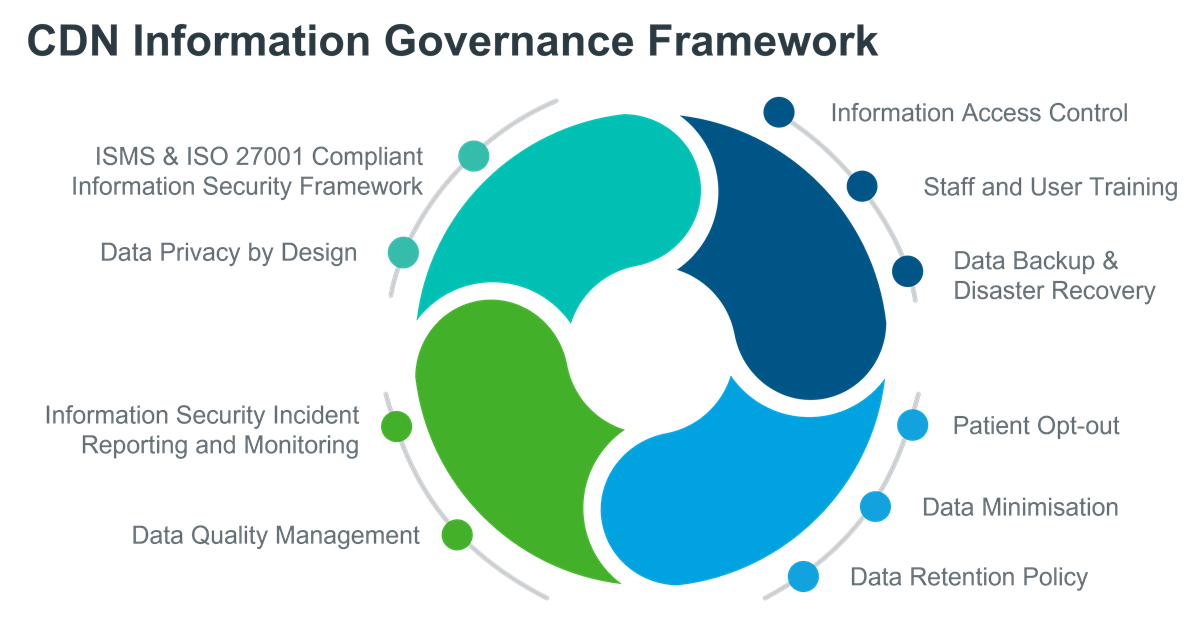



- Locations
- United Kingdom
- Why does CDN's Information Governance matter?
One in two people will be diagnosed with cancer at some point in their lifetime, and every year, almost 400,000 new cancer cases are diagnosed in the UK1. The NHS spends £7 billion on cancer treatment and care annually1. Research has shown that using cancer patient data more effectively can help to drive the development of new cancer diagnostics and cancer treatments, leading to enhanced outcomes and improved cancer survival rates. IQVIA’s Cancer Data Network (CDN) was set up with a mission to help improve cancer patient treatment outcomes using data and Business Intelligence (BI) technology integration. Partnering with DATA-CAN, a HDR UK initiative, CDN aims to collate high-quality, real-world cancer treatment data for cancer research in near real time, whilst protecting patient’s privacy.
The healthcare industry has remained the top data breach target to various internal and external hack attacks for more than a decade. Sensitive patient data is an attractive target for hackers as they are more valuable on the dark web than credit card credentials. More than 81% of UK healthcare organisations suffered a ransomware attack in 20202. Patient data breaches are more insidious as they have the potential to cause great harm. And given the high-risk ecosystem parameters, it is essential for CDN to build confidence through its Information Governance framework and demonstrate trustworthiness to NHS trusts, research groups and the public.
What is Information Governance?
At its most simple, Information Governance (IG) is wrestling with managing various risks and delivering value through data. Some think of IG purely as a legal requirement, but as Gartner3 defines, it is about the specification of decision rights and an accountability framework to ensure appropriate behaviour in the valuation, creation, storage, use, archiving and deletion of information. It encompasses the processes, policies, roles and standards that ensure the effective and efficient use of information in enabling an organisation to achieve its goals. IG is an ever-evolving discipline and has become an inevitable routine in today’s data-heavy age. It’s not a strategy that’s implemented once and then left to run its course – it’s a journey rather than a destination.
IG Influenced Technology Architecture
Information Governance and its data security policies are at the forefront of designing each aspect of the software modules to ensure cyber immunity, prevent jigsaw re-identification and data misuse.

As Crossing the Chasm author Geoffrey Moore has said: “Without data, you are blind and deaf and in the middle of a freeway.4” But too much data can be just as debilitating. With information overload, trying to make smart decisions can feel a bit like playing chess in the middle of a rock concert — it’s very hard to block out the noise and focus on the signal. Data minimisation techniques help create the optimal dataset for cancer research, with research experts approved non-identified data fields. Anonymising techniques protect patient’s privacy by irreversibly hashing, filtering direct patient identifiers and any data of patients who have opted out of the NHS Digital’s national opt-out registry for research data sharing.
CDN works closely with patients, clinicians, academicians, and the UK Health Research Authority (HRA) in formulating, reviewing, and upgrading IG policies. Stringent data management protocols are maintained for improved data privacy, access control, appropriate use of data for medical research purposes and ensuring EU, UK, NHS Digital, GDPR and other data compliances.
Improving Patient Outcomes
The COVID-19 pandemic diverted much of the attention of policy makers, public opinion, and researchers from important deadly diseases such as cancer, which will result in the increase of avoidable cancer-related deaths in the next 5 years5. It is time to bring back focus onto cancer care. Using a wide variety of privacy-enhancing technologies and safeguards to protect individual privacy, high-quality real-world data is provisioned by CDN for research and analysis to be used by academicians, NHS trusts and research bodies. Approved researchers can analyse data to better understand the value of cancer treatments and their effectiveness in curing cancer to evaluate the best treatment pathways for patients. With cancer emerging as the leading cause of death worldwide6, Cancer Data Network is needed more than ever.
2 81% of UK Healthcare Organizations Hit by Ransomware in Last Year, Infosecurity magazine, October 2021
3 Gartner Glossary, Information Governance
4 Moore, Geoffrey A. Crossing the Chasm: Marketing and Selling Technology Products to Mainstream Customers. New York : Harper Collins, 2014

